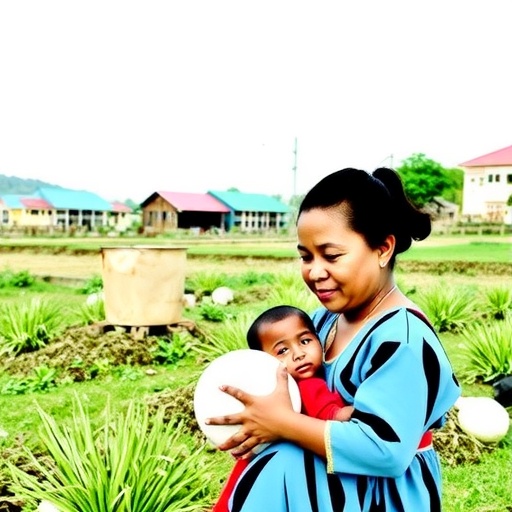In recent years, the intricate relationship between food insecurity and child mental health has garnered significant scholarly attention, prompting multidisciplinary investigations into the underlying mechanisms that mediate this association. A groundbreaking study recently published in JAMA Network Open delves into this complex dynamic, revealing the pivotal roles of caregiver stress and household instability as key pathways through which food insecurity adversely impacts the psychological well-being of children. This research represents a significant advancement in understanding how socioeconomic factors translate into mental health outcomes in vulnerable populations.
Food insecurity, defined as the limited or uncertain availability of nutritionally adequate and safe foods, has long been recognized as a damaging social determinant of health. However, its influence extends far beyond physical health ramifications, penetrating deeply into the mental and emotional spheres of affected individuals. The current study provides nuanced insights by elucidating how food insecurity contributes to elevated stress levels among caregivers, which subsequently destabilize the household environment, thereby increasing the risk of mental health problems among children.
The investigation utilizes robust epidemiological methodologies to dissect the causal pathways implicated in this association. By employing longitudinal data and sophisticated statistical modeling, the researchers were able to parse out not just correlations but potential mediating variables, highlighting caregiver stress and household volatility as paramount. This methodological rigor allows the findings to transcend mere descriptive epidemiology, offering actionable knowledge for public health policy and intervention programs.
Central to the study’s findings is the recognition that caregiver stress functions as a critical intermediary factor. Caregivers facing food insecurity are burdened with continuous uncertainty regarding their family’s nutritional needs, which exacerbates psychological stress. This heightened stress, in turn, impairs the caregiver’s capacity to maintain a stable and nurturing home environment—a factor that is especially detrimental during children’s formative developmental stages. The study posits that this chronic psychosocial stress destabilizes routine and predictability within the household, key elements necessary for child mental health resilience.
Moreover, household instability emerges as a multifaceted construct encompassing residential mobility, fluctuations in family composition, and inconsistencies in daily routines. This form of instability has been consistently linked to adverse child outcomes including emotional dysregulation, behavioral problems, and diminished cognitive performance. By connecting food insecurity to increased household instability, the study establishes a compelling causal chain that substantiates theoretical models linking socioeconomic adversity with developmental psychopathology.
These findings hold profound implications for clinical practice and public health initiatives aimed at mitigating child mental health disparities. Interventions targeting food insecurity must recognize the psychosocial stress imposed on caregivers as a critical leverage point. Policies focused solely on nutritional provision, devoid of considerations for the emotional toll on families, may inadequately address the root causes impacting child mental health. Consequently, integrated programs that encompass mental health support for caregivers alongside food assistance may yield more effective outcomes.
Importantly, the study’s utilization of a rural population dataset sheds light on the unique vulnerabilities faced by children in less urbanized settings. Rural populations often experience compounded challenges including limited access to healthcare services, social isolation, and economic instability. The nuanced understanding afforded by this research underscores the necessity for geographically tailored interventions that account for the intersection of food insecurity and household dynamics particular to rural communities.
Psychological science perspectives within the study emphasize that mental health consequences in children stemming from food insecurity are not merely transient reactions but may predispose them to chronic psychopathology. Exposure to caregiver stress and household unpredictability during critical periods may alter neurodevelopmental trajectories, thereby increasing susceptibility to anxiety disorders, depression, and other clinical conditions later in life. This longitudinal perspective reaffirms the urgency of early intervention.
Advancing the field, the research incorporates interdisciplinary frameworks spanning social sciences, demography, and physiological stress responses. By integrating these diverse academic lenses, the study presents a holistic model that captures the multifactorial nature of food insecurity’s impact. It demonstrates that addressing food insecurity in isolation is insufficient; rather, a comprehensive approach that includes family dynamics, psychological stressors, and community-level factors is paramount.
Furthermore, the study’s transparent disclosure of author contributions, methodological limitations, and potential conflicts of interest aligns with the highest standards of scientific integrity. The empirical evidence provided is rigorous, peer-reviewed, and open access, ensuring that researchers, clinicians, and policymakers can readily assimilate and build upon these findings without barriers.
In synthesizing these novel insights, the study profoundly reshapes the discourse on food insecurity from a unidimensional nutritional challenge to a complex psychosocioeconomic crisis that significantly compromises child mental health outcomes. It calls upon stakeholders across healthcare, social services, and governmental sectors to reconceptualize intervention strategies in light of these interconnected pathways.
As the global community confronts escalating disparities exacerbated by economic instability and social upheaval, this research serves as a timely beacon illuminating the cascading effects of food insecurity. By emphasizing the mediating roles of caregiver stress and household instability, it advocates for holistic, compassionate, and contextually informed policy responses that prioritize the mental health of children as a cornerstone of societal well-being.
Subject of Research: The study investigates mechanisms linking food insecurity to child mental health, focusing on caregiver stress and household instability.
Article Title: Information not provided.
News Publication Date: Information not provided.
Web References: doi:10.1001/jamanetworkopen.2025.30691
References: Information not provided.
Image Credits: Information not provided.
Keywords: Food security, Family, Rural populations, Children, Mental health, Caregivers, Stressors




